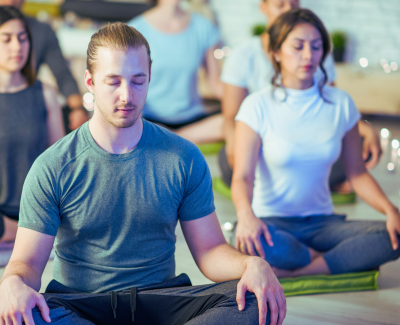April is Stress Awareness Month
10 Easy Tips to Reduce Stress That You Can Do At Home
~ Madeleine Marentette
April is National Stress Awareness Month. Decades of research from leading universities have shown that stress caused by the pressures of modern-day life is a major contributing cause of heart failure around the world. Stress is no longer limited to the world of adults either. It is rampant among young adults who have less coping skills. This has created an urgency to raise self-awareness, to assist individuals in how to self-correct, gain clarity, and calm the nervous system, especially when feelings of frustration, panic and anxiety arise.
Here are 10 recommended tips to reduce stress that you can do at home to help you calm your nerves, and you may even find room in your life for a little more joy!
1. Immerse Your Self in a Relaxation Bath
Take a warm bath in Epsom salts, Dead Sea or Himalayan salt to help relieve stress. Download some healing music such as the sounds of crystal bowls, specifically designed to calm the energetic system of the body. Light a few soy candles (no perfume), and drop some relaxation essential oils into the bath such as Lavender or Ylang Ylang. Give yourself a 20 to 30-minute break, take a few deep breaths, and allow the warmth, the salts, the scents and sounds to envelop you in calm.
2. Stop and Smell the Roses
Visit your local flower shop on your way home from work and treat yourself to a bouquet of flowers. This sounds too simple to have an effect, but who doesn’t like to receive flowers and feel the joy they bring to us? Place the flowers somewhere where you will see them often; on the kitchen counter, living room table or on your bed table. Inviting the beauty of nature into the home can have an immediate calming and joyful effect from both the visual beauty and the aromas.
3. Spring Clean and Get Organized
It’s important that our home is treated like a sanctuary. After all, it is where we spend most of our lives and the only environment we can truly control. It is interesting to note that our home, office, and even the interior of our car often reflect what is on our minds and how we are feeling at a particular time in our lives.
Look around. Is your personal space organized, clean and inspiring, or is it in disarray, unclean and uninspiring? Your personal space may be adding to your stress. Take a day to address one space at a time, which can be therapeutic in itself. Purge, donate, toss, clean, organize and smudge. Breathe new life into the space, allow in some fresh air, and get things in order. This is highly beneficial to clearing a cluttered mind, enabling us to relax, be in the flow of creativity, and deal with issues more effectively when they come up.
4. Words, Mantras and Prayer
Adopt a mantra. We know words can provide positive affirmations and act as reminders to take action. Choose a few words that resonate with you, how you wish to feel, a goal you want to work on and an outcome you want to achieve. Words are powerful symbols of thoughts, so choose those that will help you to stay calm, peaceful, and committed to your own well-being.
Prayer or an invocation is a powerful way to redirect misguided energy, turn pessimism into optimism, enact forgiveness of self or others, and change feelings of disempowered to empowerment. Write your words, mantra or prayer down and keep them with you, close to you, and post them on your bathroom mirror or fridge. Affirm yourself every day until it becomes a way of life.
5. Meditation Practice
Once you have completed some of the simpler activities noted above, schedule a day when you are able to stay at home and really slow things down. Decide on a time between two and three hours where you will choose not to speak. Turn off the phone and shut down the computers. Go about your business doing chores, laundry or making a meal. Take this time to invoke silence, listen and just observe.
Do not rush, but be gentle with your movements. Watch your incoming thoughts and allow them to float away. Don't give them any more thought. Take a deep breath and direct yourself back to silence. Keep a smile on your face. This practice can be profound and bring endless realizations. Make sure you have a journal handy so you can record any new insights. Silence takes practice, just like training a muscle. The benefits are tremendous to the mind and bring clarity and calm to our lives.
6. Practice Gratitude
Integrating gratitude into your daily routine can have profound effects on your stress levels and overall well-being. By beginning and ending each day with a moment to reflect on three things you are thankful for, you can significantly shift your mindset from one of scarcity to one of abundance. This simple yet powerful practice helps to cultivate a positive outlook, fostering a sense of peace and contentment that can mitigate stress. As you focus on the blessings in your life, you'll find your mood lifting and your resilience against stress strengthening, making gratitude an essential tool in your wellness arsenal.
7. Connect with Nature
Nature has an incredible ability to heal and soothe the human spirit. Allocating time to immerse yourself in the natural world, be it through a leisurely walk in a nearby park or a quiet moment in your garden, can significantly reduce your stress levels. The tranquillity of nature not only lowers blood pressure and reduces cortisol levels but also enhances mental health by providing a sense of peace and renewal. Making a conscious effort to connect with the outdoors on a regular basis can serve as a natural antidote to the chaos of everyday life, offering a sanctuary where your mind and body can rejuvenate.
8. Exercise Regularly
Engaging in regular physical activity is one of the most effective ways to combat stress. Exercise triggers the release of endorphins, chemicals in the brain that act as natural painkillers and mood elevators. Whether you prefer yoga, brisk walking, cycling, or any form of exercise that you enjoy, incorporating it into your daily routine can help clear your mind, reduce anxiety, and improve your overall sense of well-being. Beyond the immediate stress-relief benefits, regular exercise also contributes to long-term health by improving cardiovascular health, boosting immunity, and increasing self-esteem.
9. Limit Screen Time at Home
In today's digital age, our exposure to screens is almost constant, which can significantly impact our stress levels and quality of sleep. Particularly before bedtime, excessive screen time can disrupt our natural sleep cycles, making it harder to fall asleep and leading to increased stress. By establishing clear boundaries for electronic device use, such as setting a specific cutoff time in the evening, you can help ensure a more restful night's sleep. Taking breaks from screens throughout the day also helps to reduce mental fatigue, making it easier to relax and decompress.
10. Nourish Your Body with Healthy Meals
Incorporating a diet rich in whole, nutrient-dense foods plays a crucial role in
managing stress levels effectively. Foods high in antioxidants, omega-3 fatty acids, and vitamins can help reduce inflammation and stabilize mood. Embrace the therapeutic activity of cooking by purchasing our cookbook or exploring some of Grail Springs’ Kitchen's favourite recipes, designed to nourish both body and soul. From energizing breakfast options to calming herbal teas, these carefully curated recipes support a balanced diet, acting as a cornerstone for a stress-reduced lifestyle.
Discover More at Grail Springs
While these at-home tips for reducing stress are helpful, the journey towards stress reduction doesn’t end there. Grail Springs offers an oasis of tranquillity and rejuvenation for those seeking to deepen their journey to wellness. From retreat packages tailored to foster relaxation and healing to our holistic spa treatments, we invite you to explore the transformative experiences we offer.
To learn more about how you can embark on your path to personal wellness and stress reduction, contact us at Grail Springs. Our dedicated team is committed to guiding you through an enriching journey towards a more balanced, peaceful life. Remember, taking the first step towards stress reduction is not just about improving your current state of being – it’s about transforming your life for years to come.

.png)

